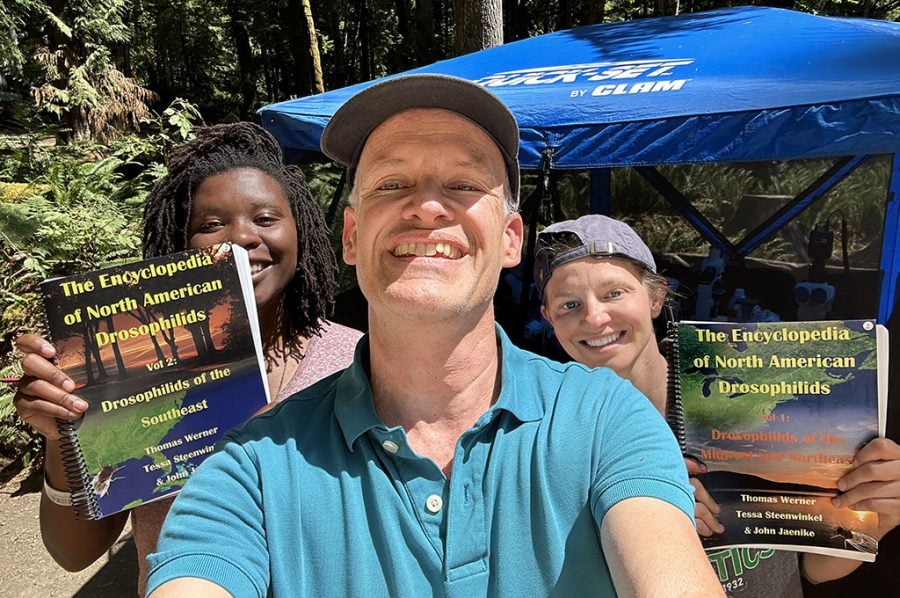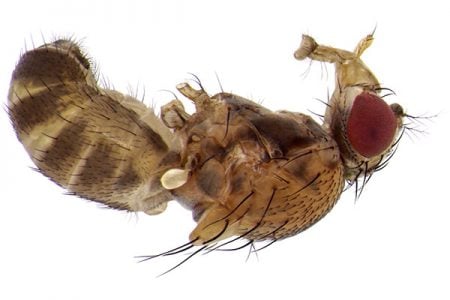
Thomas Werner, a North American fruit fly expert, entomologist and biological sciences professor of genetics and developmental biology is celebrating the release of his latest volume documenting fruit flies across the continent—and Huskies are invited.
The Michigan Tech release party for the book, “The Encyclopedia of North American Drosophilids Volume 3: Drosophilids of the Northwest” is from 3-5 p.m. Wednesday, April 9 in rooms 243-244 of the Van Pelt and Opie Library. The authors will be giving away autographed bookmarks. Printed copies of the book will be available for guests to peruse. Refreshments will be served.
In addition to Werner, his two co-authors, Tessa Steenwinkel and John Jaenike, and the book’s illustrator Natalia Werner will be at the event.
Steenwinkel, who earned her bachelor’s degree at Michigan Tech in 2020 and her master’s degree in biological sciences at the University in 2021, is the namesake for Amiota tessae, a fruit fly species Werner discovered and named after his mentee.
Jaenike, a professor emeritus of biology at the University of Rochester, has collaborated closely with Werner over the years since the fruit fly documentation initiative began.
The latest volume is the third in a series, all of which have been made available digitally via open access. Volume one covers fruit flies of the Midwest and Northeast, while volume two lists species of the Southeast. The newest volume took more than four years to complete, during which volumes one and two were also updated.
“The book is not so much about new discoveries, but instead is a comprehensive field guide to all drosophilid species inhabiting the Northwest of the US mainland,” said Werner.

Each volume strives to identify all drosophilid species in the targeted region and remarks on interesting aspects of the insects’ biology. The books are intended for researchers, teachers, and students alike interested in the diversity of the species and provide suggestions for future research. One highlight of the volumes is the photography, featuring high-quality, pristine images of both living fruit flies and dissections. Werner and his team capture these images using a solar-powered mobile lab, a process documented by filmmaker Daniel Shaykevich in the documentary All the Little Things.
Volume 3 contains the first images ever captured of the super-rare species Drosophila flavopinicola. The newest volume, as well as the updated first two volumes, feature a new bedtime story for kids at the end of the book as what Werner calls, “a regular part of our outreach to the next generation of scientists.”
With this volume published, the authors look forward to Volume 4: Drosophilids of the Southwest, which will complete their book series on fruit flies in the mainland United States. The final volume is expected to take around 10 to 15 years to complete, as the southwestern United States has more than 170 recorded fruit fly species—more than twice what was covered in each previous volume.
About the College of Sciences and Arts
The College of Sciences and Arts is a global center of academic excellence in the sciences, humanities, and arts for a technological world. Our teacher-scholar model is a foundation for experiential learning, innovative research and scholarship, and civic leadership. The College offers 33 bachelor’s degrees in biological sciences, chemistry, humanities, kinesiology and Integrative physiology, mathematical sciences, physics, psychology and human factors, social sciences, and visual and performing arts. We are home to Michigan Tech’s pre-health professions and ROTC programs. The College offers 25 graduate degrees and certificates. We conduct approximately $12 million in externally funded research in health and wellness, sustainability and resiliency, and the human-technology frontier.
Follow the College on Facebook, Instagram, LinkedIn, X and the CSA blog. Questions? Contact us at csa@mtu.edu.